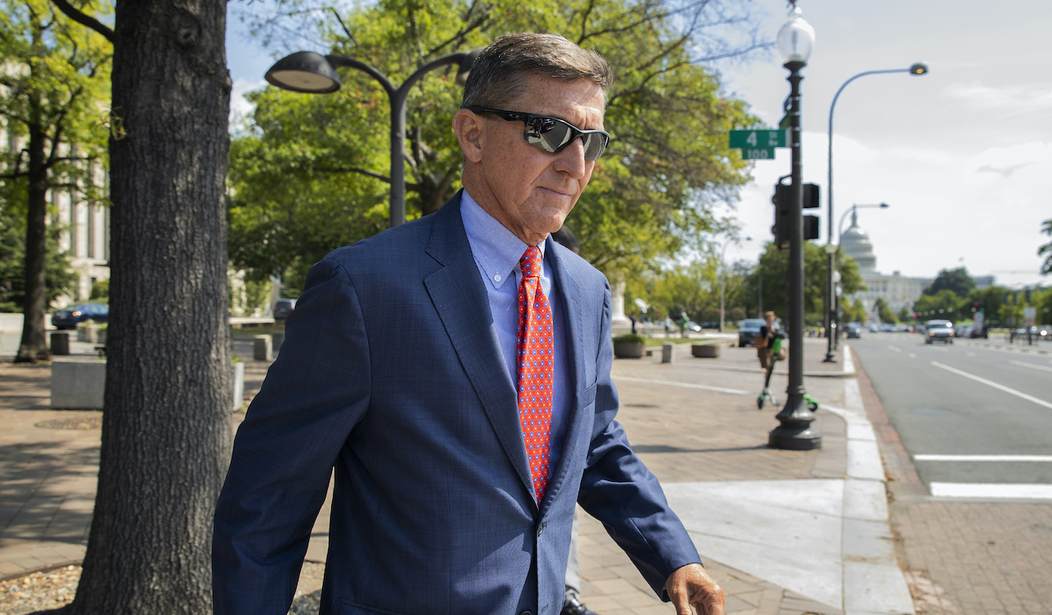The Michael Flynn case will soon be over. It began on Jan. 24, 2017, just four days into the Trump administration, when two FBI agents went to the White House to interview Flynn, then the brand-new national security adviser. Ignoring protocol, they questioned him about a phone call he had a few weeks before, during the transition, with Russian Ambassador Sergey Kislyak. By the end of the year, Flynn had pleaded guilty to lying to the FBI in that interview.
Now, the Justice Department has moved to drop the charges, and a judge will soon accept that decision. But before the Flynn matter recedes into history, there is more the public needs to learn about it. Specifically, the public needs to know more details about the way the FBI handled the politically sensitive case. And even more specifically, how do we know what Flynn said in that interview on Jan. 24?
In accordance with usual FBI practice, the interview was not recorded. The agents took notes during the interview and were supposed to return to the office to write up what was said. The writeup is a form known as the FD-302. FBI rules give agents five working days to finalize the document.
If someone is going to be charged with lying to the FBI, it will be on the basis of what is in the 302. There's no recording and there are no other witnesses in the room. If an interview subject claims not to have said something, the proof otherwise is the 302 and the agents' word. So the 302 is obviously critical if the Justice Department chooses to charge someone for lying in an FBI interview.
That's why it is important to know the tortured history of the Flynn 302. In the Flynn case, nothing worked as it should have. Nothing. It is believed that one of the two agents who interviewed Flynn, whose identity has, remarkably, never been publicly revealed but has been widely reported to be an agent named Joe Pientka, wrote a 302 shortly after the interview. That recollection, the freshest memory possible, is usually regarded as the most reliable version of what was said in the interview.
Recommended
Here is the amazing thing: Michael Flynn's defense has never seen the original 302. Never. Flynn, under enormous pressure from Trump-Russia special counsel Robert Mueller, pleaded guilty to lying to the FBI without ever reading what Pientka originally wrote about the interview.
Instead, the FBI almost immediately began editing the Flynn 302. Pientka's partner in the interview, Peter Strzok -- remembered as the agent dismissed from the Mueller special counsel investigation for his anti-Trump texts with extramarital lover (and senior FBI official) Lisa Page -- took the lead. On Feb. 10, after the FBI's five working days limit expired, Strzok did what was apparently a major editing job on the Flynn 302, and he also incorporated edits suggested by Page, who had not been present at the interview. In a text message, Strzok said, "I was trying not to completely re-write the thing so as to save [REDACTED] voice." It's thought that the redacted name was Pientka's. The finished document was dated Feb. 14, 2017, which just happened to be the day after Flynn was fired by the White House.
But wait -- there's more. At the time all this was happening, top FBI officials did not think Flynn would be charged. Then-director James Comey told Congress exactly that in March 2017. The Flynn case, apparently, was put on the shelf. But then, on May 17, 2017, Trump-Russia special counsel Robert Mueller was appointed. The Flynn file came down off the shelf as Mueller's team looked for a way to exert pressure on Flynn to spill whatever he knew about some prosecutors' preferred theories of collusion.
And then -- Voila! -- came an all-new 302. In December 2018, as part of Flynn's sentencing, the public saw another document entirely. It was called the Flynn 302, but it was, in fact, a record of an interview of Strzok -- not Flynn -- conducted by another FBI official on July 19, 2017. Even then, after all the changes, it was hard to see the document as the basis of charges against Flynn.
"Throughout the interview, Flynn had a very 'sure' demeanor and did not give any indicators of deception," the 302 read. "He did not parse his words or hesitate in any of his answers. He only hedged once, which they documented in the 302. Strzok and [Pientka] both had the impression at the time that Flynn was not lying or did not think he was lying."
Is it any wonder why Republicans have had questions about the Flynn prosecution? Now, it appears to have come to nothing with the Justice Department's move to drop the case against Flynn. But even if Judge Emmet Sullivan, as expected, dismisses the charges, there are still things -- important things -- the public needs to know about the case. Like, what, precisely, was said during that fateful interview at the White House on Jan. 24, 2017?
Byron York is chief political correspondent for The Washington Examiner.

























Join the conversation as a VIP Member